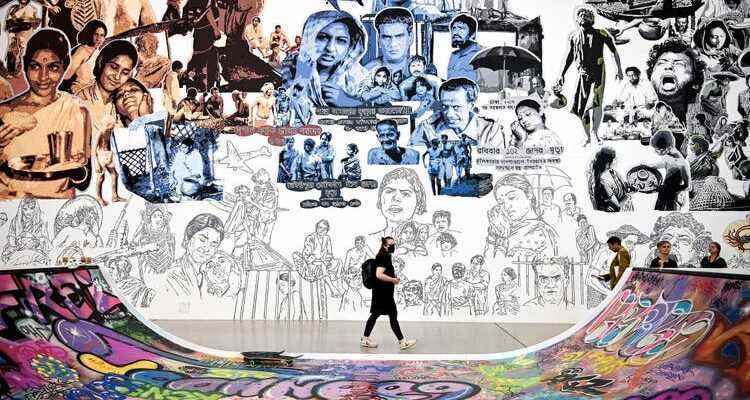For the first time, a collective of non-Western curators is directing the world art exhibition in Kassel. The result is only marginally related to art. It’s about colonialism, racism, climate and sustainability.
View of the Documenta hall with the wall painting by an artist collective from Bangladesh.
You sleep well in Kassel. This has to do with the forests in the area. Trees produce a lot of oxygen, so even a head heavy with too sweet German wine is quickly cured. Almost all the wines in the world can be found here. Kassel is a German provincial city. But it is international, at least since the major art show Documenta has been taking place there.
In any case, the people of Kassel are happy about this connection to the big wide world. And they are tranquility itself, not even the onslaught of all the cultural workers and art enthusiasts will change that. You come to Kassel when the Documenta is on. And that’s only every five years. Luckily maybe. So Kassel has its peace.
But that’s over for now. The Documenta has opened for the fifteenth time. Now Kassel will be disturbed for a hundred days because the big event lasts that long. He had five years to bloat. Until then, before the opening, the air was half out again.
There were heated debates about anti-Semitism allegations against the organizers of the Documenta. The Indonesian collective Ruangrupa, who are curating this year’s edition, simply turned the tables and posed in an open letter bad testimony to German politics in dealing with racism out.
culture of debate
There are arguments at the Documenta, that’s nothing new. And now, once again, the seemingly troubled questions of what art is and what it should be today are up for discussion. That, too, has tradition. The first editions of the art show founded in 1955 were intended to be a wake-up call and to elevate German post-war society to contemporary, primarily abstract art and then also art from America. The modern art denied to the Germans during the Nazi era was new and unusually different. Since then, the Documenta has maintained this pattern issue after issue: showing other art.
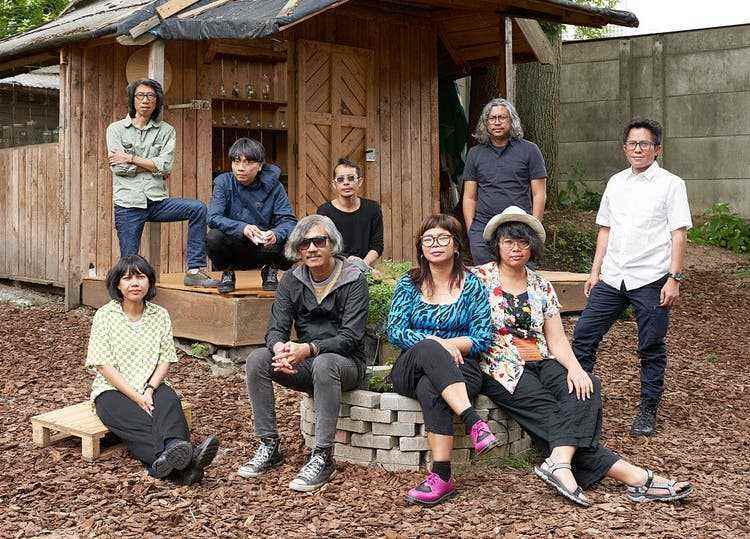
The Indonesian curatorial team Ruangrupa in the installation «Vietnamese Immigrating Garden» (2022) by Tuan Mami (Nha-San collective).
This time, the Documenta’s calculations were in line with this tradition: Firstly, to select a collective of curators to replace the previous one-man show of a single curator. Secondly, with Indonesia, a board of trustees was invited from a country that does not belong to the western world. So nothing is completely new, but the choice was certainly creative. The result is a documenta that brings the global and post-colonial South to Kassel. For once, the West is largely locked out. And according to the organizers, the West also includes the State of Israel. Israeli artists were not invited.
You could say: This is radical. But it is above all stupid and politically absolutely unforgivable when Israel of all things, for which Germany has a special historical responsibility, is excluded from the most important German art event. Unceremoniously changing the usual perspectives, Kassel was better at that. This is what Harald Szeemann did with the fifth edition in 1972, when no more art was shown, but the show became a hundred-day event of action art and improvised art happenings. And this is how Joseph Beuys did it in 1982 at the Documenta 7 when he planted 7000 oak trees in Kassel.
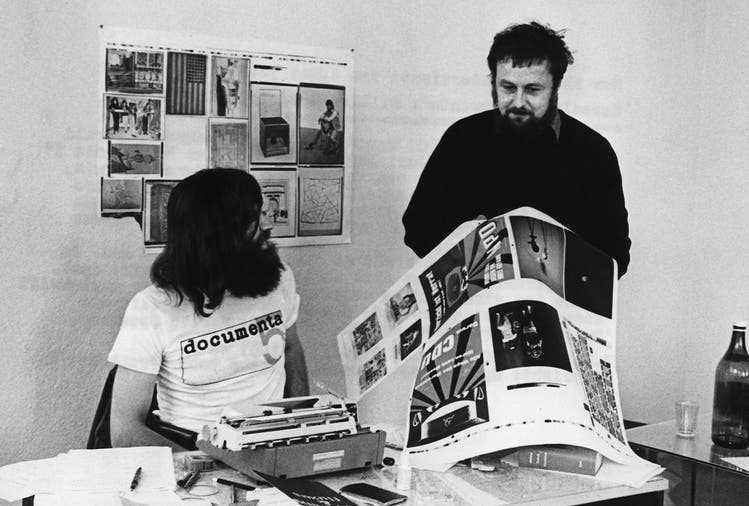
The Swiss curator Harald Szeemann (right) at the Documenta 5 in Kassel in 1972.
This works particularly well in Kassel. The city, which was bombed and burned out as a result of the war, is a wasteland compared to the art metropolises of this world. Every work of art, no matter how dubious, sparkles here. Here, what would otherwise not appear as such in a dream can become art. That can be deceptive. What is good? What’s good here? But that can also be an advantage. Nothing distracts here. Kassel gives every form of art a chance. Everyone who counts among the greats of contemporary art has exhibited here. And maybe you can start small right here.
Time zones instead of nations
So this time the names of the vast majority of those invited by the Indonesian team of curators Ruangrupa are white spots on the international art map. More specifically, you hardly find any real artists on the lists of participants. Platforms, archives, workshops, agencies and publishers, activists, queer groups and women’s organizations have been invited and will now have a stage in Kassel. And these were not selected according to nations, but according to time zones: West Indonesian, East African or Uzbek time and, yes, even Central European time were taken into account.
However, many groups at the Documenta are only marginally concerned with art-specific issues. Rather, their concerns are of a social nature. It’s about gender, but also about colonialism and racism or about climate, sustainability and alternative forms of agriculture. Where artists appear as individuals, they are often activists using artistic means.
For example, the Australian indigenous Richard Bell, who campaigns for the rights of the Aborigines. The Indian Sourabh Phadke, on the other hand, is actually a bricklayer, but mainly works as a teacher who teaches children social studies. Then there are also comic artists and filmmakers in Kassel. Above all, it seems important not to show any conventional art, such as can be seen at Art Basel or the Venice Biennale. Because it is linked to commerce.
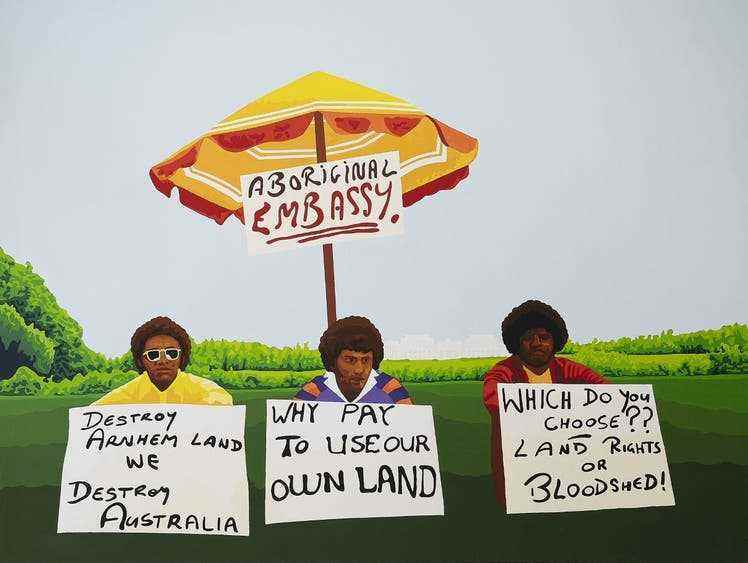
Richard Bell is an indigenous activist from Australia who is now showing his pictures at the Documenta, here «Umbrella Embassy», 2022, at the Fridericianum, Kassel.
What emerges as a whole is quite a bit strange. The Museum Fridericianum, the main venue of every Documenta, was transformed into a kind of school with a library, kitchen and dormitory. Workshops, discussion rounds and karaoke evenings are held here, as well as the so-called Nongkrong – an Indonesian slang term from Jakarta for hanging out together.
Archives such as The Black Archives also present themselves here. This is a historical archive of black Dutch writers, scholars and activists with a collection of over 10,000 books, documents, photographs and art objects. And here you can even see art in the more traditional sense: the platform Off-Biennale Budapest, which is currently working on a project for a transnational Roma museum, shows works by Roma and Sinti artists.
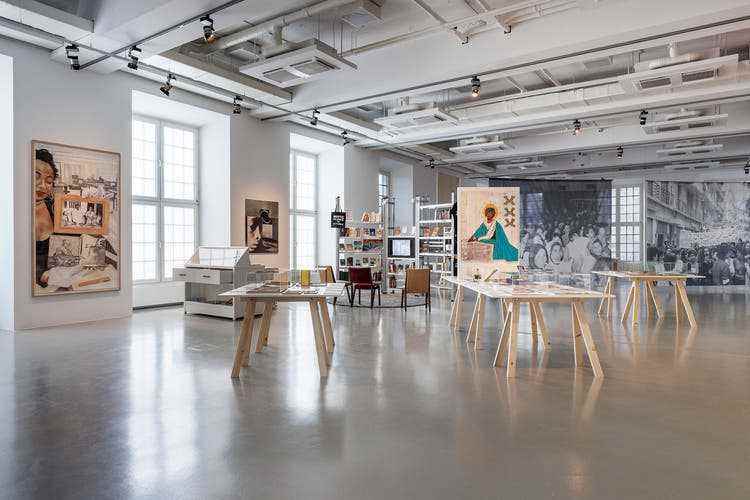
View of the exhibition hall in the Fridericianum, where the Dutch archive “The Black Archives” is presented.
But you can also come across tots crawling around on the floor in the Fridericianum. For example, in a nicely furnished crèche for parents and toddlers with a sandpit, fabric swings and a certified labyrinth, as well as play materials with no predefined use. This is in the spirit of the Hungarian educational reformer Emmi Pikler, who relied on the natural ability of small children to express themselves. The crèche was set up by the German artist and young mother Graziela Kunsch, who also shows her videos and works of art by colleagues from her network here.
This is also a counter-concept, including alternative pedagogy. And even with German participation. According to its own standards, the Documenta believes that it is once again doing everything right: by offering a platform to activists who already think they are on the right side if they stand up for what they see as a better, fairer, more sustainable and more inclusive world. You will certainly sleep particularly well in Kassel over the next hundred days, because with a clear conscience.
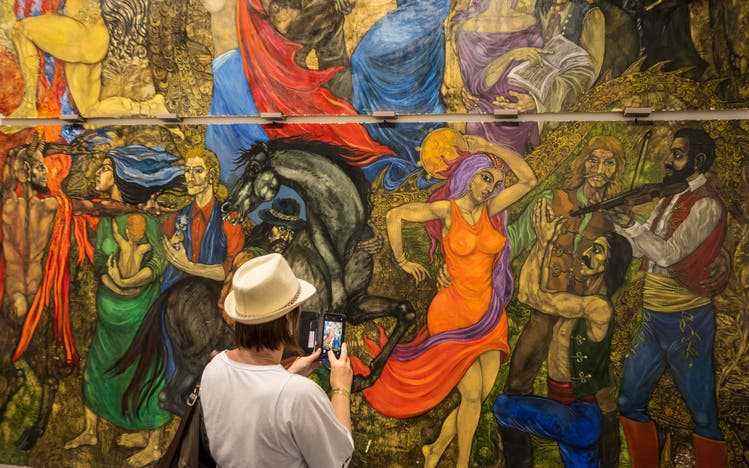
Ethel Brooks: «RomaMoMa Manifesto for Documenta fifteen», mural, 2022, Fridericianum, Kassel.
Kassel, Documenta, until September 25th.
